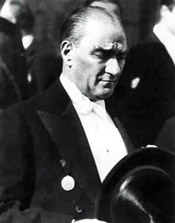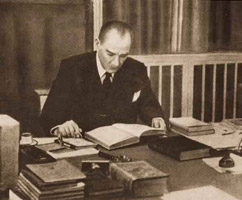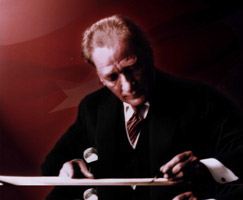
“Peace at Home, Peace in the World” |
Mustafa Kemal Ataturk, the great leader of our National War of Independence who pioneered the revolutions and reforms that founded modern Turkey, appeared for the first time in the stage of history through his military genius, though the characteristics that make him immortal in the hearts of the Turkish people and place him in a privileged position among the most important leaders of the world are his statesmanship, the outstanding success he showed in the field of governance and his peaceful and democratic vision, which is still valid today. The foreign policy vision adopted by Ataturk, the goal set with his maxim of “Peace at Home, Peace in the World” and the resolute policies he followed to that end have constituted the most significant factors that have enabled the Republic of Turkey to attain her current position.
|
Following international developments, diplomacy and foreign policy closely since his youth Ataturk was aware that the Republic of Turkey, the establishment of which he dreamt of even at those times, could attain a well-deserved position among modern nations only with an effective foreign policy and foreign relations on a solid basis. For this reason, foreign policy and Turkey’s position in the international arena had always been a high priority for Ataturk. He thought that Turkey’s future depended on a solid vision and resolute policies to be followed in this direction.
Ataturk approached every issue primarily through the lens of rationalism and realism. This was reflected in his foreign policy vision as well. Thus, the foreign policy stance adopted during the arduous National War of Independence, was first and foremost consistent with the main goal of establishing an independent Turkish State within national borders. This attitude, rejecting adventurous and expansionist inclinations without compromising on independence, left its mark on a set of developments that secured the unconditional independence of the Republic of Turkey. Among those developments were declaring as unacceptable the provisions postulated in the Treaty of Sevres and Armistice of Mudros and the negotiation and implementation of the Treaty of Lausanne in line with national interests.
The primary objective of Turkish foreign policy was gaining independence through military and diplomatic struggle against the warring states of that time. Afterwards, Turkey’s fundamental foreign policy principle was defined as “peace”. This objective has found its best expression in Ataturk’s “Peace at Home, Peace in the World” maxim and today continues to be the basic guiding principle of our foreign policy.

“A direction of peace aiming at the security of Turkey and which is not against any nation will always be our principle.” |
In line with this objective, efforts were exerted in order to create a regional and international environment of safety and stability that would enable Turkey to realize her great potential in every field. Likewise, the Republic of Turkey, which was founded on modern values and making headway in order to become a secular, democratic and social state of law, strengthened her friendly relations with countries that share the same principles. This was realized without being hostage to the problems of the past and a friendly and cooperative hand was extended to all countries, as required by Turkey’s interests. The most concrete example of this was Turkey’s bringing to an end the antagonism towards Western states against whom she conducted her struggle of independence, trying to benefit to the maximum extent possible from the opportunities offered by peace and laying solid foundations of relations with these countries that would subsequently strengthen further.
|
Furthermore, in this period, the value attributed to peace by the young Republic of Turkey that came out of longlasting battles, was reflected in every field of foreign policy. In this framework, all problems were aimed to be solved through diplomacy and negotiations by considering mutual interests. Turkey’s participation in 1929, in the Kellog-Briand Pact which stipulated that all disagreements should always be solved through peaceful means, constitutes a natural reflection of this understanding. Likewise, the settlement of several issues such as Turkish-Greek problems, Mosul, Hatay and the Question of the Straits in a peaceful way through diplomacy formed the most striking examples of the realistic diplomacy implemented in light of the conditions of the time as well as the importance Turkish foreign policy attached to peace.
Thanks to this balanced and rational foreign policy pursued during her weakest period in military and economic terms, Turkey reinforced her sovereignty over the Turkish Straits; the country’s geopolitical and strategic integrity was maintained; Hatay which was part of the National Pact was integrated to Turkey without any wars; an improvement which was not witnessed before in Turkish-Greek relations was achieved and resulted in a period of friendship and cooperation between the two countries which also spread throughout the Balkans. As regards the Mosul Question, the League of Nations’ arbitration was accepted instead of unilateral acts. As a result of this, although Mosul was not assigned to Turkey, this demonstrated very clearly her respect for international law and peace. Thus, Turkey became the only country to be invited to the League of Nations without submitting an application and she joined the organization in 1932.
Hence, the most important characteristics of Turkish foreign policy during the Ataturk era are its peaceful nature, its realism, the utmost importance it attributed to international law and legitimacy, the priority it gave to regional and international cooperation and dialogue. Furthermore, another remarkable feature of Ataturk was his capacity to monitor closely the developments in the international arena, foresee their evolution accurately and take timely steps as deemed necessary in Turkey’s interests.

“Elimination of disputes should be the primary wish of civilized humankind.” |
In this framework, assessing thoroughly the developments in the world and especially in Europe, Ataturk predicted years in advance that a new world war would break out. In his discussions and statements; he touched on this issue as early as in 1932. At a time when the Nazi Party came to power in Germany, Italy made efforts to expand to the Mediterranean and the Balkans, and the European states were engaged in an arms race, Ataturk accelerated regional cooperation efforts upon accurately analyzing these developments threatening world peace and the process leading to World War II. Consequently, on 9 February 1934, the Balkan Entente was signed between Turkey, Greece, Yugoslavia and Romania, and on 8 July 1934, the Sadabad Pact was signed between Turkey, Iran, Iraq and Afghanistan. Thus, Turkey took important steps to ensure security and cooperation both in the east and the west at a time when the whole world was being dragged into a new all-out war. Furthermore, Turkey paved the way for the policy of neutrality she would follow during World War II.
|
Foreign policy achievements of the first years of the Republic were the results of the policies of Ataturk who accurately analyzed the period, turned the situation in favor by waiting for the conditions to mature and acted in cooperation with all countries in accordance with the country’s interests. Consequently, the Republic of Turkey established an external environment that could enable the comprehensive reforms and revolutions to take hold inside the country and she could mobilise her energy and resources to realize those. It was for the same reason that the Republic of Turkey born from the ashes of an empire could focus on her future rather than her past, determine her interests calmly and with common sense and take the necessary steps intrepidly. Thanks to its characteristics and achievements, the foreign policy of the Ataturk era served as an example for several other countries. Furthermore, it became a successful model testifying that the essential warrant of independence and welfare was peace, not war.
These fundamental principles and orientations of the foreign policy of the Ataturk era provide the basis for and shed light on current Turkish foreign policy. As a matter of fact, also today, Turkey wants to achieve peace, stability and security to the widest extent possible starting from her neighborhood . Furthermore, she aspires to ensure that all countries become an indispensable part of a common area of prosperity with a win-win mindset and in line with mutual interests. Pursuant to recent changes in the international environment and positive developments increasing her means and possibilities, Turkey exhibits a more active approach in this direction and takes firm steps forward in accordance with the objective and vision set by Ataturk.
Thus, our foreign policy efforts focus on the establishment of a fair and sustainable political, economic and social order from which all parties will benefit by means of political dialogue, economic cooperation and cultural harmony in the world, starting from our region. Our efforts to that effect continue resolutely. Ataturk’s principle of “Peace at Home, Peace in the World” still constitutes the cornerstone of Turkish foreign policy today.
Turkey is a country whose friendship and cooperation are sought more and more in the international arena, whose active efforts are needed to a greater extent in the settlement of disputes and who makes concrete contributions to global peace through her enterprising and humanitarian foreign policy implemented in her region and beyond. Turkey takes pride in being able to follow on Ataturk and the fundamental principles he set in our foreign policy.